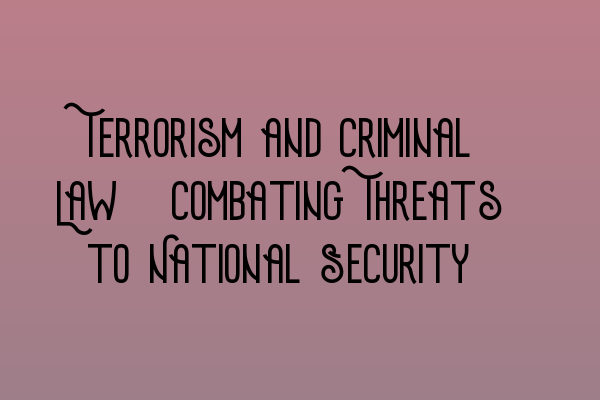Terrorism and Criminal Law: Combating Threats to National Security
In recent years, the world has witnessed a significant increase in terrorism threats that pose a grave danger to national security. As a society, we must be prepared to confront these challenges and take effective measures to combat terrorism. In this blog post, we will explore the role of criminal law in fighting terrorism and safeguarding the interests of our nation.
The Legal Framework
The legal framework surrounding terrorism and criminal law is complex and constantly evolving. Legislation and international agreements play a crucial role in defining and combating acts of terrorism. Key statutes, such as the Terrorism Act 2000 and the Counter-Terrorism and Security Act 2015, provide the legal basis for identifying, prosecuting, and preventing acts of terrorism.
To effectively address the multifaceted nature of terrorism, our criminal justice system employs a range of legal measures. These include surveillance powers, the proscription of terrorist organizations, restrictions on travel and finance, and the ability to prosecute individuals involved in planning, promoting, or supporting terrorist activities.
Investigation and Prosecution
Investigating and prosecuting those involved in terrorism requires meticulous planning and collaboration between law enforcement agencies, intelligence services, and the judiciary. Specialized counter-terrorism units are tasked with gathering intelligence, conducting investigations, and building strong cases against individuals and organizations implicated in terrorism.
In many cases, evidence gathering involves close monitoring, electronic surveillance, and interception of communications. The use of these powers is regulated by strict legal frameworks, ensuring that the rights and liberties of individuals are upheld while preventing serious threats to national security.
Once an investigation is complete, prosecutors play a vital role in bringing the perpetrators to justice. Their expertise in navigating complex legal frameworks and presenting compelling cases is essential for securing convictions. The Crown Prosecution Service (CPS) in the UK works closely with law enforcement agencies to determine whether there is sufficient evidence to bring charges and conducts prosecutions in court.
Preventative Measures
Prevention is a key aspect of combating terrorism. The UK has implemented a comprehensive counter-terrorism strategy, known as CONTEST, which focuses on four key areas: prevent, pursue, protect, and prepare.
The “prevent” strand of CONTEST seeks to stop individuals from becoming radicalized and engaging in acts of terrorism in the first place. This involves early intervention programs, community engagement, and partnerships with educational institutions to identify and support individuals who may be vulnerable to radicalization.
The “pursue” element of the strategy aims to detect, investigate, and disrupt terrorist activities. It involves proactive policing, intelligence sharing, and international cooperation to identify and apprehend individuals involved in terrorism-related activities.
Protecting the public is a core objective of the “protect” strand. This involves enhancing physical security, critical infrastructure protection, and risk management to minimize the impact of a potential terrorist attack.
Lastly, the “prepare” aspect of the strategy focuses on building resilience within society. This includes training emergency services, raising public awareness, and strengthening international partnerships to effectively respond to and recover from terrorist incidents.
The Role of Legal Professionals
In the fight against terrorism, legal professionals have a crucial role to play. Solicitors and barristers specializing in criminal law possess the expertise and knowledge required to navigate the complex legal landscape and ensure that justice is served.
If you’re interested in pursuing a career in criminal law, it’s essential to acquire the necessary qualifications and skills. Preparing for the SQE (Solicitors Qualifying Examination) exams is an important step towards becoming a qualified solicitor. You can find invaluable resources and preparation courses, such as SQE 1 Practice Exam Questions and SQE 1 Practice Mocks FLK1 FLK2, to help you succeed in these exams.
For those who have already qualified as solicitors and wish to specialize in criminal law, supplementary training courses are available. These SQE 2 Preparation Courses and SQE 1 Preparation Courses provide comprehensive instruction on criminal law and practice, equipping legal professionals with the knowledge and skills required to excel in this field.
Conclusion
As threats to national security continue to evolve, the importance of criminal law in combating terrorism cannot be overstated. Our legal system provides the necessary tools to investigate, prosecute, and prevent acts of terrorism. By continually refining our strategies, collaborating across borders, and staying one step ahead, we can strive towards a safer future.
If you’re interested in learning more about the SRA SQE exam dates and requirements, visit SRA SQE Exam Dates.
